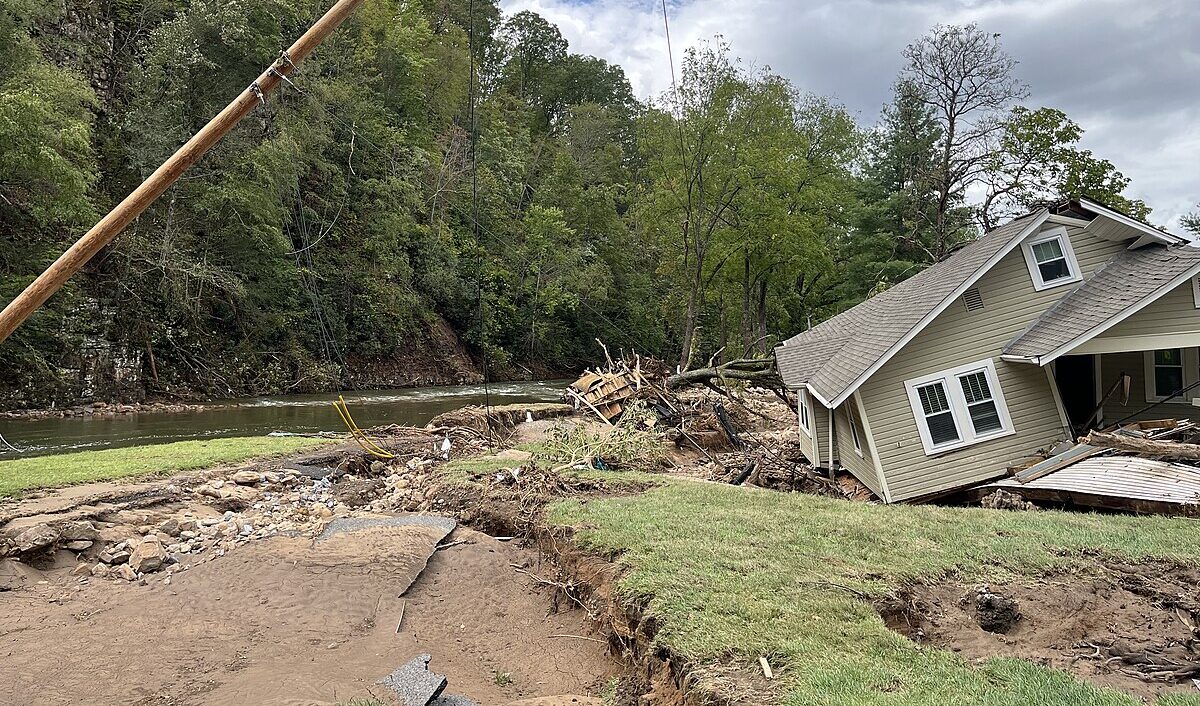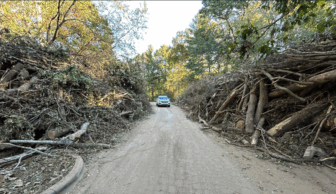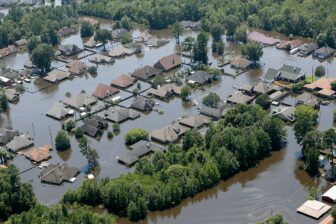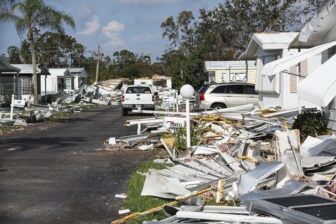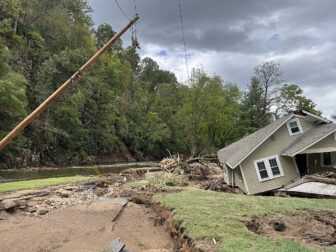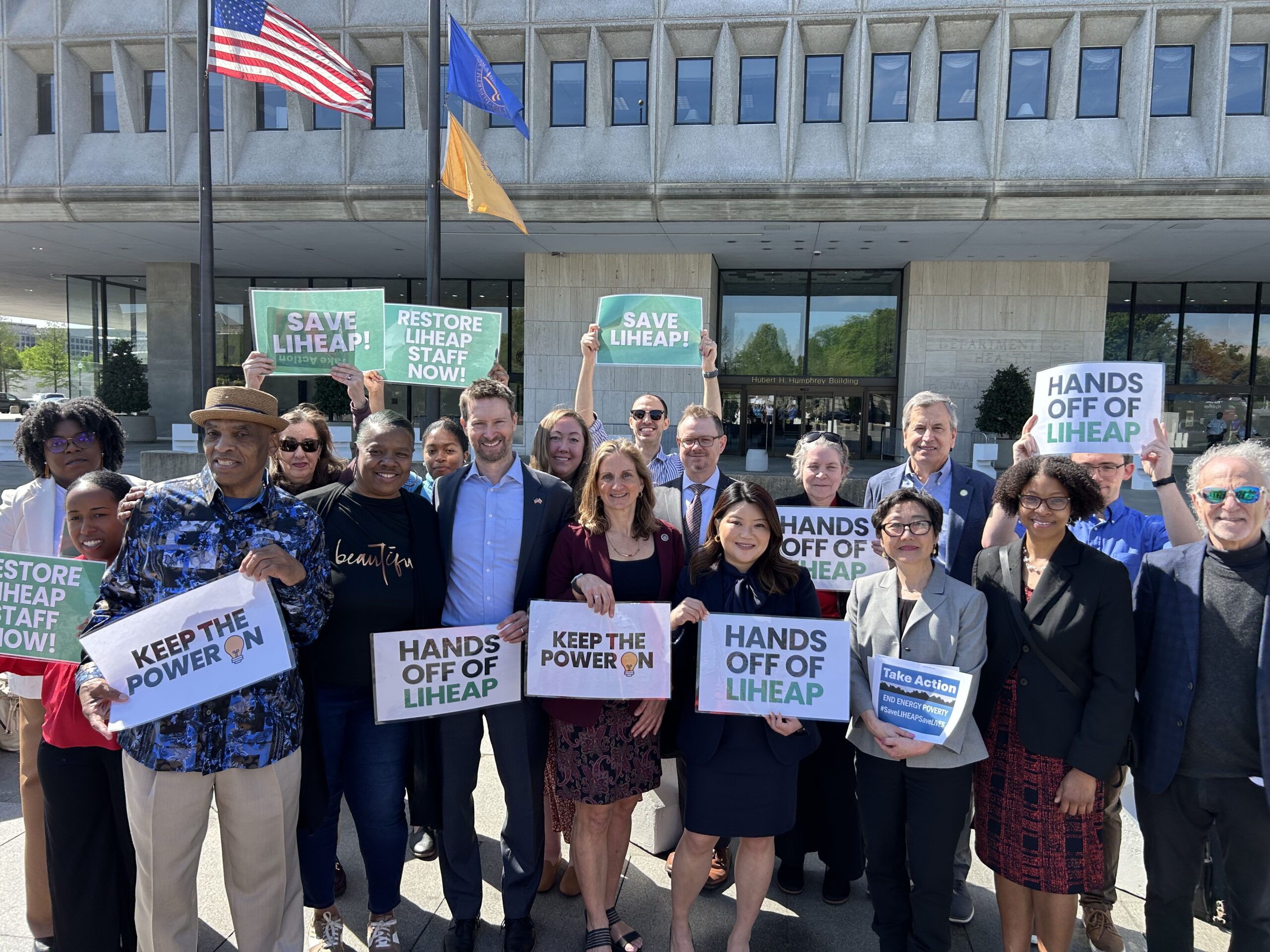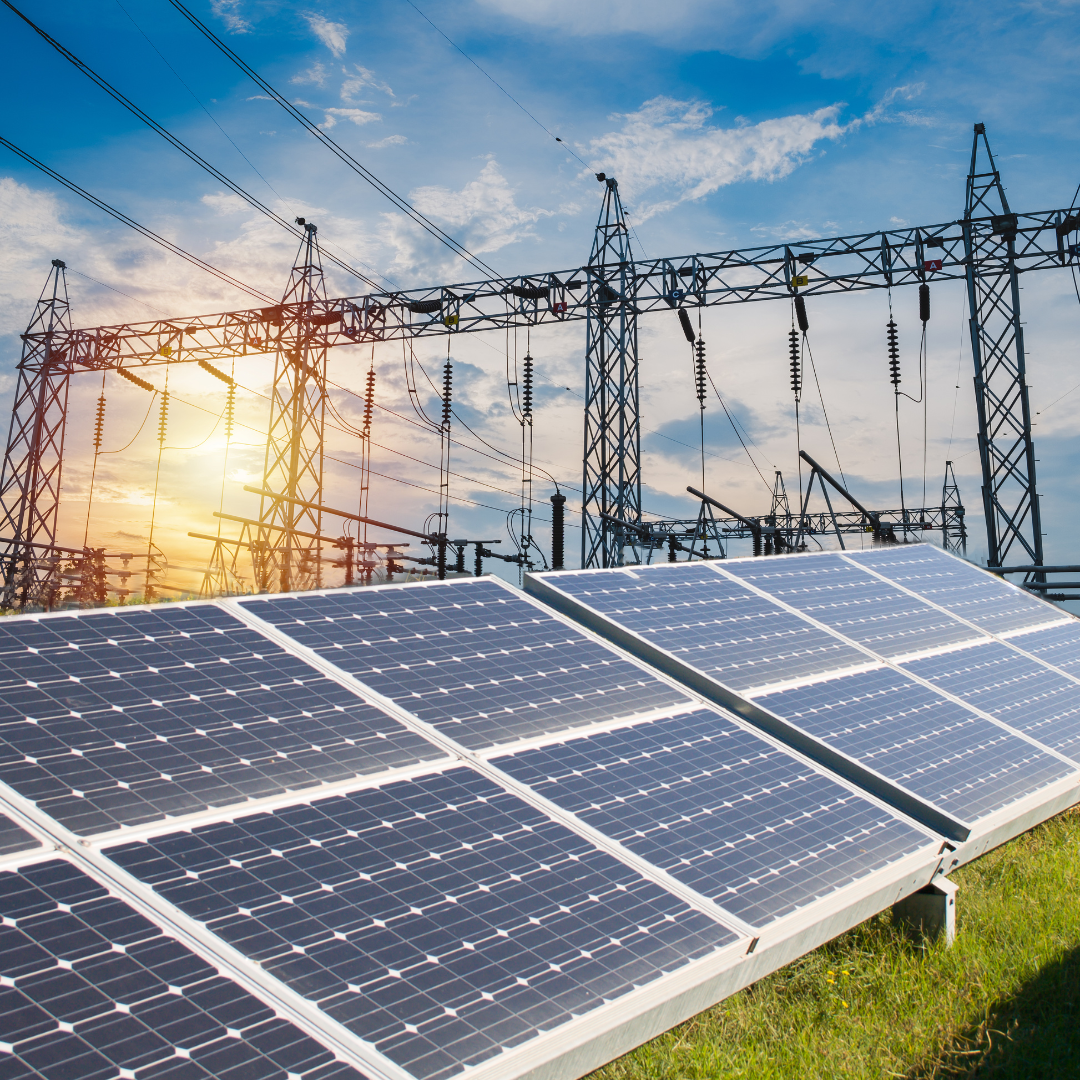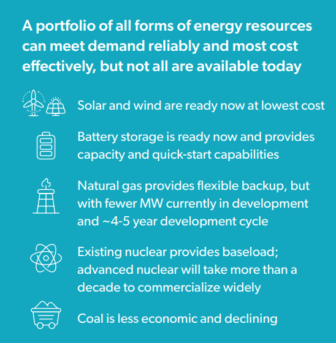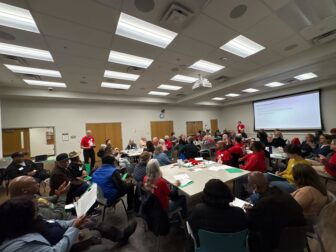This interview first aired on Maryland Energy Talk and is reprinted here with permission.
Welcome back everyone. This is Maryland Energy talk for April 17th 2025: Mike Tidwell’s new book, The Lost Trees of Willow Avenue. I’m your host, Jamie DeMarco. Mike Tidwell is the founder and executive director of the Chesapeake Climate Action Network, and a successful author. Over the past 20 years he has dedicated practically every day of his life to doing the most he possibly can to reduce the harmful impacts of climate change. In the past few years that has meant, on top of being an executive director for a regional nonprofit, waking up before dawn every day so he could write a new book. That book, The Lost Trees of Willow Avenue: A Story of Climate and Hope on One American Street is now out and available for purchase. It is an emotionally gripping narrative with valuable and at times surprising insights of where the climate movement is headed. I am overjoyed to be sitting down with the one and only Mike Tidwell to talk about his new book. How you doing, Mike?
I’m doing great. It’s wonderful to be with the one and only Jamie Dimarco, who also apparently doesn’t sleep. Does great work as a lobbying advocate. And now has a podcast.
JD:
It’s true. I have been waking up early during session to do this podcast so I’m grateful to be able to do this and work on this podcast in a more reasonable hour now that session is over. Mike, you had told me years ago that you were never going to write another book that you know the book market. Isn’t that great? And you didn’t have anything to share with the world that wasn’t already out there. Obviously, since you told me that—it must have been like three or four years ago, you’ve written a new book. And you’re a busy guy, and you’re executive director of a nonprofit. What compelled you to write this book when you didn’t plan to write a book, and you don’t have a bunch of free time to write a book.
MT:
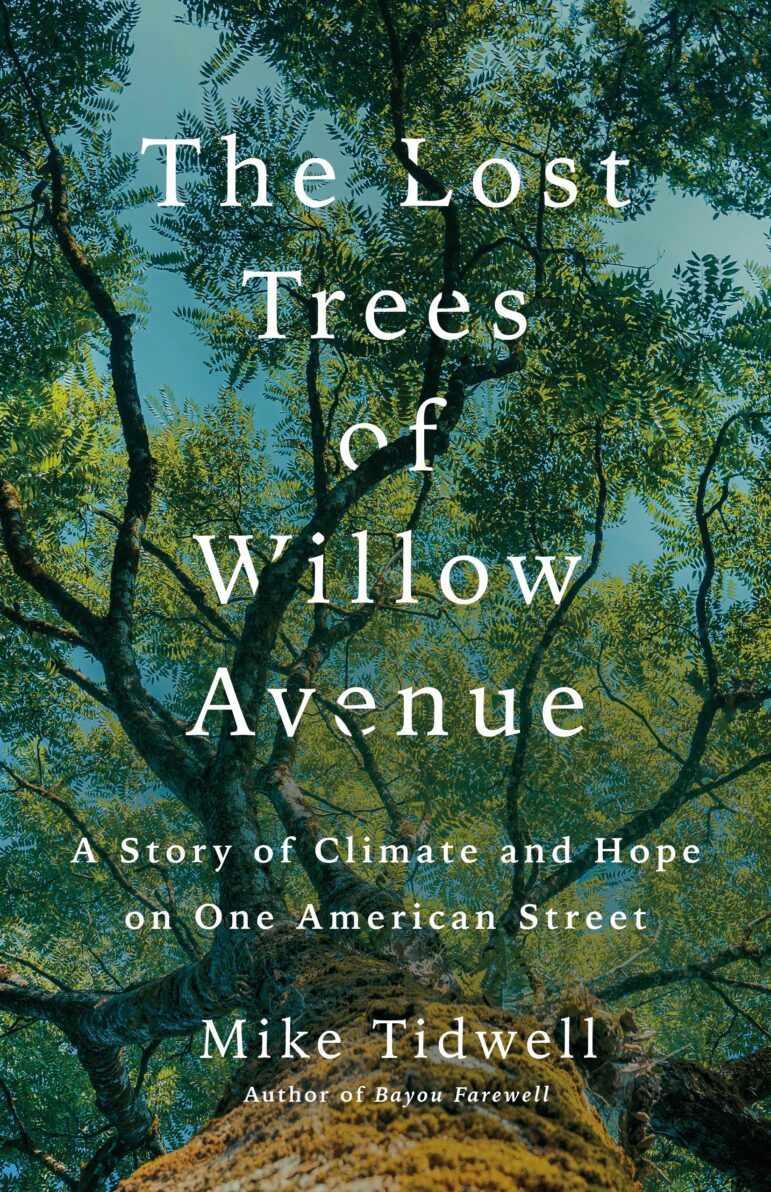 Well, I finally felt like, after 19 years of having written my last book, 19 years had gone by, and I, for the first time in almost two decades, felt like I had an original idea. I felt like I had something to say. Writers will also often tell you that they write a book when they can’t not write it, that the idea just won’t let go. It just jumps on your back and stays there until you deal with it. And that had not happened to me for a long time. I wrote six books by the time I was 45 years old, I think, and just was really busy running CCAN for the last 20 years. But finally I just had this idea that maybe I can and should write a book about climate change on my one block in Willow Avenue, just one microcosm. And the idea took hold, and I wound up writing The Lost Trees of Willow Avenue.
Well, I finally felt like, after 19 years of having written my last book, 19 years had gone by, and I, for the first time in almost two decades, felt like I had an original idea. I felt like I had something to say. Writers will also often tell you that they write a book when they can’t not write it, that the idea just won’t let go. It just jumps on your back and stays there until you deal with it. And that had not happened to me for a long time. I wrote six books by the time I was 45 years old, I think, and just was really busy running CCAN for the last 20 years. But finally I just had this idea that maybe I can and should write a book about climate change on my one block in Willow Avenue, just one microcosm. And the idea took hold, and I wound up writing The Lost Trees of Willow Avenue.
JD:
Wow! And I have read a lot of books about climate change, and I think a lot of them try to connect on the personal level, and none of them have been successful. The way that I think your book was because it is looking at the people and the places you love, which is really why we are in this work. So you said, it’s sort of looking at your street and your block. What is this book about? And how does it explore your community?
MT:
Well, I’ve lived on this block of Willow Avenue, in Takoma Park, Maryland, right on the border with Washington, DC. So we’re an old trolley neighborhood of the nation’s capital. I’ve lived on this block for 34 years. And if you live in one place for that long, you’re going to see changes now. In past times those changes would be, babies are born, old people pass away, fashions change, buildings get rebuilt. What have you. That’s more normal change. But in our world of rapid climate change, if you stay in one place you will see the impacts of climate change on that block. And that’s what I write about the changes that I’ve seen. And these changes of climate change involve flooding. They involve Lyme disease, which is very prominent in my neighborhood, because our milder winters don’t kill off as many ticks, but they principally involve the mortality of old trees which I’ve really noticed. So I write about that, and it’s not me saying that these old trees, dying in mass numbers across the mid-atlantic. It’s not me saying it’s climate change. It’s the city arborists for Takoma Park, the Public Works Department, the private tree care companies. They all say the same thing.
And the point that I make in the book is that 30 years ago, when I moved to Willow Avenue, you would have had to go to the Great Barrier Reef or to the Arctic to really see the beginning impacts of climate change up close and to credibly point to those impacts as global warming. Fast forward to 2025, you can see them right in your front yard. And the point that I make in the book is that, especially in the last five or six years, these changes are really accelerating. And again, with a tremendous impact on trees.
JD:
Yeah, I don’t know of anyone who’s written a “climate change on my block” book the way that this has. I think the world is full of books listing the biggest climate disasters in the world. But this, I think, is a novel approach of like zooming in on one particular place and looking at all the ways that climate change has affected what is otherwise a pretty, resilient and well-off community. But even there the impacts are inescapable and really detrimental.
MT:
Yeah. And I think even five years ago a New York publisher would laugh you out of the room. If you said, I have an idea I have this one block of 14 houses in the DC suburbs. And I’m going to write about how global climate change is affecting my block. But I didn’t get laughed out of the offices of New York publishers because it’s a reality. We’re seeing it. One of the points that I make in the book is, climate change has gotten so bad that you could take a spinning, lacquered globe and take a dart and throw it at that spinning globe. And wherever that dart lands anywhere on the planet. You could write a whole book about the conspicuous climate impacts happening right at that micro dot.
And the reason I know that is, I’ve done it with my block. And I write about again lots of different impacts, but especially trees on my one block. Just in the last few years we’ve lost 500 years of tree growth. So there’s 150 year old Southern red oak, 150 year old, willow oak, 80 year old, willow, 100 year old white oak. These trees are massive, and they’ve all died on my block. Our canopy has been decimated.
One arborist told me that our native trees, our native oak trees, our other native species. Trees are no longer native in this region. We’ve changed the climate, therefore they’re foreigners, and why would we expect otherwise? You know, we change the climate. They’re getting sick and they’re dying. And I raised the question, if that’s happening to our trees, if our trees are becoming foreigners, what does that make us as human beings? You know human civilization evolved over 10,000 years of a very stable climate. The Holocene. That climate regime is gone. We’re foreigners on this planet, too, and we really ought to do more about that.
JD:
Absolutely. And the book is sort of a journey. As you explore the impacts on your block, it takes you to places you maybe didn’t expect to go, or places where people don’t know we’re going—really valuable, and surprising insights in the book. But I think the beginning of that journey starts with the rains of 2019. Do you want to talk about how those have affected and sort of set off this cascading series of effects?
MT:
The book is broken down into two parts. The first and second chapters of the book are the History of Takoma Park as a city. The history of climate change in Takoma Park and my history as a climate activist. Those are the first two chapters. Chapters 3 through 12 are one year of climate change on my block. So that’s January to December 2023. I follow these climate impacts on my block. And all these different characters that I meet. And you know, I basically test this theory that you can write a whole book about one block by saying, Okay, I’m going to keep a journal for one year and see what happens. I couldn’t keep up. I couldn’t keep up with the unbelievable cascading impacts. I was discovering in my neighborhood the incredible characters who were trying to solve the problem, who were suffering from the problem.
JD:
Because you started writing this book in 2023, not knowing that 2023 was going to be the hottest year on record, and that all these impacts would happen. And you were sort of writing this book and the effects of climate change just sort of kept hitting you over the head as you were keeping that journal.
MT:
Yeah. And I could keep the same journal this year and next year. But yeah, 2023 wound up, being the warmest year on record by a long shot surpassing the previous record of 2016. Unfortunately, 2024 surpassed 2023, and I do want to tell readers that my book, The Lost Trees of Willow Avenue, not only talks about the negative impacts of climate change, the subtitle has the word hope in it, and that’s because at the same time that we see the passing of trees in my neighborhood, we’ve seen the coming of clean energy. We’ve seen solar power. We’ve seen so many electric cars in this progressive neighborhood. My neighbor Paula calls it the faint harmony of angels that you hear when electric cars go down the street. The first gas station in America to switch entirely from pumping gas to charging cars is right here in Takoma Park, RS Automotive owned by Mr. Doley. If you get a chance to, charge your car here.
JD:
With solar panels on the canopy?
MT:
That’s right. So it’s about the impacts of climate change on my street during that period, and also about the amazing changes in terms of clean energy. But the whole story does begin in 2018. Those rains were in 2018 when I first had this idea of writing a tree, of writing a book about my blog. I knew I wanted to write about trees, and that’s because I had been hearing from the city reading in the city newsletter talking to neighbors who’ve had their big trees come down. People were whispering. They were saying something seems to be changing. A paradigm shift of some kind seems to be happening around us in the form of mass tree mortality. The city was pointing to beetles. They were pointing to extreme weather. There was some vagueness to it, and I decided, you know, I want to know exactly what happened. I want to know step by step, if this is climate change, I want to be able to describe it.
JD:
Like the good reporter you are.
MT:
Thank you and I was very curious. So I started interviewing arborists. I started interviewing entomologists and weather experts, and they all pointed to the same thing. The year 2018, we got record rainfall by a long shot, not just in Maryland, but throughout the mid-atlantic Maryland, got more than two feet additional rain than normal during 2020 during 2018, and it began with climate change in the form of the jet stream. You know this highway of wind that goes west East in Southern Canada. Normally it’s where it resides. It dipped all the way down to the Gulf of Mexico, an extraordinary change in its pattern in 2018. It did that because the jet stream is created by the temperature differential of the very cold Arctic and the milder middle latitudes, and when those two air masses collide, joined by the rotation of the earth, it causes winds to circulate around the planet, and that affects weather all over the planet. But as the Arctic warms up exceptionally fast, even faster than the middle latitudes because of global warming, those wind speeds are slowing down, and that highway of winds is wobbling, and in 2018 it took a huge dip all the way to the Gulf of Mexico, captured tons of moisture, and then brought it up to the mid-Atlantic and dumped it on the mid-atlantic. We had successive atmospheric rivers of rain in the mid-Atlantic, record rainfall in 2018 from New Jersey to the Carolinas to West Virginia, to this day there’s still records for rainfall.
JD: I had never heard that term before. Atmospheric river, like just imagining a river sort of leaping out of the Gulf of Mexico and just landing on top of the entire East Coast.
MT:
Yeah, crashing down. And it looks like a river in the satellite maps, and what happened was the ground in the mid-Atlantic, including in my neighborhood of Takoma Park, was so wet for so long that it triggered the explosive growth of an otherwise latent mold in the ground called Phytophthora, which translates from Greek to plant destroyer.
JD:
Not a good sign.
MT:
This mold exploded in the soil and one of its favorite hosts, one of its favorite foods is the fine root tips of oak trees, and so unbeknownst to us after the rains of 2018. As the spring of 2019 came, there was this mold underground, silently attacking our oak trees, especially the big ones decimating their roots. What happened then is, the spring arrives in full, and the trees have no choice. They have to leaf out. They have to create a canopy overhead to conduct photosynthesis to live, and the trees are adapted in extreme circumstances, extreme drought, extreme floods to build leaves without the use of their roots, borrowing energy from their core, carbohydrates from their trunks. It’s a very stressful process. They do it infrequently, and it really stresses out the trees.
But so our beautiful canopy in Takoma Park. We call ourselves Tree City, U.S.A. We’re obsessed with trees in Takoma Park. We have lots of old trees, used to have a lot more. We name our streets after trees, dogwood, spruce, willow, maple. In the spring of 2019 our trees were so stressed out unbeknownst to us, and we’re borrowing energy from their core leafing out. But that chemical process vents a gas called ethanol. As part of this process, ambrosia beetles are like hound dogs, they smell it, they attack trees, and so began in the spring and summer of 2019. This chemical warfare between beetles and trees in my neighborhood, where at some point the first beetle drilled the first hole into the first tree. That tree responded by flooding that wound with this bitter tannin substance that the tree creates, the beetle disengages, and then tries again. Then the trees vent a scent to insects that like to eat ambrosia beetles, saying, Come, there’s a meal on my trunk, and this warfare went on back and forth in 2019, until finally the beetles just overwhelmed so many of our trees killing them. You could see the sawdust remains on the trunks. And we just had this mass mortality event triggered by the rain. We lost 1,200 really big trees in Takoma Park between the middle of 2019 and the middle of 2021 and most of these were just spatial giants, really big canopy trees.
The city of Takoma Park, since 2018, has lost 45 acres of canopy. According to a city study, our landscape has changed. We still have some big trees, but we’ve lost so many. And this all began with a wobble in the jet stream, triggered by climate change, bringing moisture from the gulf, soaking our soil, triggering a mold, damaging roots, stressing trees leading to beetles. And that’s what has been killing our trees.
JD:
Wow! Congratulations on sort of following that thread all the way back and telling this epic narrative that was sort of unfolding around us. So obviously all this epic rainfall is really bad for the trees, but it is really bad for human infrastructure, too, and one of the chapters of the book I found most compelling is the stormwater runoff that you talk about in ways totally overwhelming any systems that could have been able to handle it. And even the potential options we have to handle it. I honestly think that as I think about climate change more and more, stormwater runoff is the biggest problem that is going to cost the most people in the most places the most money. So talk about, in addition to overwhelming these tree roots and bringing this mold that brought the beetles that killed the trees. What does it mean for sewers and for drainage pipes?
MT:
One of the things that really really shocked me in the process of writing the book. I knew that I was seeing impacts of climate change as I started the reporting. What I did not know is that just as you have what scientists call cascading impacts of climate change globally, you know. You thaw, you heat the atmosphere which thaws the tundra which releases methane, which makes the warming even worse. These sort of cascading impacts globally. I didn’t realize that I would begin to see cascading impacts in my neighborhood. So as I learned about Phytophthora, the plant destroyer mold, I learned about rain, I learned about the tree behavior, I also learned that when trees die they subtract from a community, the ability to manage flooding. The number one thing you want in a flood in a period of strong rain are really big trees, the roots absorb the water, the canopies, the billions of trees, create a friction of leaves that slows down the rainfall hitting the ground. It’s just the number one thing you can do for flood management.
JD:
When it starts to trickle, if you’re under a tree, you don’t feel it, and then, when it’s done trickling, if you’re under the tree, you are going to feel it because those drops are coming later. So it spreads out the peak.
MT:
Exactly. And what’s happening in my neighborhood is we’re getting, as is the case across all the east coast of the United States, we’re getting more extreme precipitation events because of global warming. And those precipitation events are not only killing trees, but they’re also just flooding our neighborhoods. And on September 10th 2020, in Takoma Park we got a scarcely believable five inches of rain in one hour, and it just flooded maybe a thousand basements. It flooded my church, which is just a block from my house. Takoma Park, Presbyterian Church flooded our boiler room, leaked water into our preschool, and completely freaked out the church leaders. They went to the city, they said, this can never happen again, whatever it takes. Build whatever pipes, whatever you have to do.
But our church can’t flood like this again, and the city responded in several ways. One, they said, we don’t have money to help you with your flooding. We spend half a million dollars a year on flood control across the city. You’re not the only one having problems. We just don’t have the resources. Number two, part of your problem, Takoma Park, Presbyterian Church is that so many trees have died on Willow Avenue in the last few years that you’re not only getting bigger rainstorms, but that water is barreling down from the south toward your church. So what we can do for you is we happen to have some sidewalk money. And we could bust up your perfectly good sidewalk on half the block right next to your church. Bring in 30 tons of soil, elevate your sidewalk 14 inches, repave it, and you’ll have a new sidewalk. Not that you needed one, but you’ll have a flood berm. They basically created a flood device, a flood berm. And if you know what you’re looking at, and you’re walking down Tulip Avenue in my neighborhood you will see the elevated sidewalk. That is what keeps our church dry in the world of climate change.
These cascading impacts, the trees dying on Willow Avenue, the bigger storms from climate change, and a community that is becoming pushed to the brink of financial distress by just dealing with this flooding, and it’s throughout my neighborhood.
JD:
But, as you say in the book, that little sidewalk berm doesn’t make the water go away. It redirects the water away from your church’s basement into the city’s drainage system. But what happens once it gets there, it’s sort of passing the buck to the next step. So what is the next step?
MT:
Well, Ian Chamberlain, who’s the deputy director of Public Works in Takoma Park just like I wanted to learn everything about the trees. I wanted to learn everything about how water flows in Takoma Park, and how that’s changing with climate change. And he said, Look. This flood berm that we built will protect your church up to and equal to the September 10, 2020 storm. You’re going to stay dry. But it’s inevitable with climate change that the storms are going to get even worse. And I said, Well, what are you going to do? How do you protect this? What’s the next step of protection, he said, well, it costs $45,000 to build this elevated sidewalk. If this fails we’ll have to spend a million dollars.
JD:
That is a big jump.
MT:
To build a pipe from the top of Maple Avenue all the way down to the city’s main. Basically send it all the way down to Sligo Creek, which is the main creek that runs through Takoma Park. So what would be a Takoma Park Presbyterian Church problem would become a Sligo Creek problem. You would just putting so much more rain, and you could do that for all of Takoma Park. If you had enough money, you could just build giant pipes and just completely inundate Sligo Creek. But then you’re just pushing the water downstream and blowing out bridges and roads and affecting Prince George’s county, which is downstream, which has even fewer resources to deal with this. So that’s not really a solution. Ian Chamberlain. When I asked him this, he said, There are three main options. One: stop climate change immediately. And then there was this pause after he said that, and he grimaced and went on to the second one. Two: Push all the water to Sligo Creek, in which case you create a Sligo Creek problem and a Prince George’s County problem, not manageable, very expensive, very. Doesn’t solve a problem just shifts the problem right? Or option three: Keep the water where it is and manage the flooding, retain the water. And this is where things get kind of radical and mind blowing, he said. You know, basically, you could dig giant caverns underneath Takoma Park like the District of Columbia is doing to help the combined water and sewage problem that they have, and raw sewage going in the Potomac and Anacostia that’s costing 5 billion dollars.
JD:
With a B?
MT:
With a B. To create these giant tunnels underneath the district.Maybe the last of those in this world of financial constraints. Takoma Park can’t possibly do that. Another idea is to build giant cisterns on top of roofs or in basements, so every property has to keep the water where they are, and then the final radical idea is on every block in Takoma Park. Knock down one or two houses on the downslope side of the block, knock down the houses and build retainment ponds. You know, evict the owners, destroy the houses in a world where we don’t have enough housing, but you could build retaining ponds on every block, the idea being to retain the water. It ain’t going to happen, you know, and so I draw the conclusion in the book that, look, every region of the world has something they can’t adapt to that’s emerging with climate change. Fires in California sea level rise in Miami, where we live here it’s extreme rainfall. Yeah, financially, practically. It is hard to imagine how we’re going to adapt to the kind of rainfalls that we’re starting to see that are not only killing our trees and compounding the problem, but that sooner or later are just going to bankrupt us. So we have to focus on this issue of somehow stabilizing the climate.
JD:
Yeah, if anyone was listening to you list those options of, you know, build a cistern on every roof, or knock down a few houses to build, retaining ponds, and thought maybe those would be options one. They are extremely expensive, and no governments have excess cash right now. And two: It’s politically impossible. I mean those of us who are familiar with Maryland politics. Remember that many years ago there was an effort to reduce stormwater runoff. That was a big reason why Governor Larry Hogan got elected, a Republican who, you know, became a governor in Maryland by running on what he called the rain tax. And so this is not only financially impossible, but politically impossible, and at times physically impossible to sort of actually adapt to this. There are a lot of other journeys you go on in this book. You follow an incredible character. Who’s doing groundbreaking, literally groundbreaking work, burying trees, and I want to save some of that for the book. But as you explored all these impacts on your block, I think it took you somewhere. You maybe didn’t expect to be. What did you find yourself thinking, as you sort of walked home from those conversations with your city planner, saying, you know the only thing we could do is build a cistern on every house.
MT:
Well, again. The subtitle of the book is “a story of climate and hope on one American street.” So there is hope, and I want to get to that. I will tell you that one of the things that I learned among the many things that I learned that I didn’t know before was the connection between trees and human beings in terms of friendship and health. This is a sad book, The Lost Trees of Willow Avenue. It’s not just sad, but there’s a current of sadness throughout the book from beginning to end, and it’s focused on these magnificent trees, these life-giving trees that are in my neighborhood, and especially oak trees, I mean oak trees, are evolved to support a greater variety of life forms than any other tree genus in North America which I did not know before I started writing this book I tell the story of one tree in my neighborhood that belongs to the Miller family, Lisa, Dave and their son Wesley, 150 year old Southern red oak that went into steep decline after the rains of 2018, and finally was cut down in early 2021. That one tree, an arborist, told me, and there’s a photograph in the book of this fantastic tree stump that’s just incomprehensibly huge, and the Miller family is dwarfed while standing next to it. I mean, this tree began its life in the 1870s, probably with a blue jay or a squirrel bearing an acorn, predates the neighborhood, lived through World War One, survived Teddy Roosevelt, the Great Depression, Ronald Reagan, the dawn of smartphones. Until climate change. And the Miller family they are still grieving over that loss.
The stump is like a tombstone, and we have these like tombstones throughout our neighborhood like a graveyard, and people grieve over it. One arborist told me, when a tree dies in a National Forest, it’s a statistic. When a tree dies in your backyard it’s a friend. In Takoma Park I can ask anyone who tells me they lost a big tree, they’ll say, Oh, yeah, I lost a tree in 2019 2020. And I’ll say, what ceremony did you conduct when that tree died? I won’t say, did you? I’ll say what ceremony! And they always say we drank a bottle of wine. We sang our favorite songs, we read a poem, we lit a candle.
These were friends. These were family members. People still grieve in Takoma Park, and as I explored that relationship between trees and people, not just this sort of sociological component, but also the health impact. There are all kinds of studies showing that this concept of forest bathing, of being around big trees brings healing to us. It improves our immune system, lowers our stress levels, lowers our cortisol levels. Patients in hospitals who can just see a tree through a window recover faster than patients who don’t see trees. So in the book I write about this, and I say, look in a city like Takoma Park, Tree City, U.S.A., such a glorious canopy! So much of it now disappearing. If these trees are contributing to our well-being and to our good health, what happens when they disappear? And I argue that it’s contributing to a decline in our mental health. It’s contributing to a reduction in our immune systems. So more people do get diseases like Lyme Disease. So these are again, these compounding factors of climate change. And another reason why we need to plant more trees, especially oak trees, because one arborist told me the Miller tree probably supported between 500 and 1,000 lifeforms. One tree from rat snakes to ravens, to aphids, to lichens, and especially, which I did not know, oak trees in North America are co-evolved with an amazing variety of moths. And if you look in the summer you will just see so many different kinds of moths congregating around our biggest oak trees. In the spring, of course, those moths begin as caterpillars, small caterpillars, and they emerge about right now, mid-April and May, right as the migratory birds are arriving from South and Central America. It’s a key food source, these caterpillars, for migratory birds, and, as you know, 500 years of oak tree growth has disappeared from my one block in the last five years. That’s a whole buffet for migratory birds gone. So I encourage people. As we lose trees we have to replant. We have to try to continue to work, to stop climate change, but especially we need to plant oak trees.
JD:
So you said you wanted to come back and talk about hope. I think a lot of people maybe feel less hope right now than they would normally feel with the Trump administration coming in and promising to fight clean energy and make sure coal plants stay online. How do you talk about hope in the book? And do you think it is still relevant in the era of Trump?
MT:
Well, in my book, The Lost Trees of Willow Avenue. Yes, the subtitle is “a story of climate and hope on one American street.” One thing that I observed in writing this book is that when really big trees come down in my neighborhood of Takoma Park one of two things happen. Solar panels very often go up suddenly. Someone’s house has a very sunny roof and they put up solar panels or their flat roof. Commercial establishment does the same. So solar panels happen or two gardens happen, people suddenly start gardening. My neighbor Dorothy, who’s a character in the book, she’s a midwife, she’s amazing, they built a geothermal system in their backyard years ago, when our 80 year old willow oak died on our street in the summer of 2023. During this calendar year that I chronicled climate change in my neighborhood. We planted a garden. We planted a vegetable garden exactly where the stump was. The city took out everything, including the stump, and we’ve planted a tree on the non-sunny side, so that eventually this tree is going to put us out of business. But we’ll have a good 10 years of gardening. But clean energy is a reality in my neighborhood. We’re sitting on the 7th floor of the office of the Chesapeake Climate Action Network, and almost every roof that we see around us either has solar panels on it or heat pumps for heating and cooling homes. It’s throughout my neighborhood. There’s solar, the electric cars that I mentioned earlier. But the message that I really try to give to readers is that no matter who is President, no matter what majority is in Congress, this revolution cannot be stopped. It could be slowed down a little bit here in the United States, but every day around the world human beings deploy a gigawatt of solar energy every day. That’s like a major nuclear power plant of solar every day. The largest auto market in the world is China, and half of all cars sold in China this year will be electric. Australia, a country known for coal, is going to be near 100% clean electricity, carbon-free electricity by 2030. Then we have the Blue States. We have California, we have Maryland, New England, Upper Midwest. Nothing can stop this. Again Trump can slow it down, but he no longer. He does not rule the world, and the world’s moving on without us. And eventually we’re going to catch up, and I see that in my neighborhood, and one of the scenes in the book is, I go with my state delegate, Lorig Charkoudian, District 20 house of delegates from Takoma Park, Silver Spring. My neighbor, we go out with you. You were on this trip, and we visit an offshore wind farm 27 miles off the coast of Virginia Beach, which was one of the best days of my life. It was a cloudless September day. It was like we were in a painting, and we took that boat out, and we were underneath these massive wind turbines whooshing overhead, while incredible life forms of minnows and barracuda and turtles and jellyfish were below us. There’s reason to be hopeful. We’re going to complete the clean energy revolution. In the next few decades fossil fuels will disappear. But one of the points I make in the book is that we’ve arrived at this revolution too late for clean energy alone to save us.
JD:
So you’re holding multiple truths at once, one truth being that the clean energy revolution is unstoppable. And we are, as this podcast likes to remind its listeners at the end of the podcast, we are one day going to have 100% clean energy, 100% electrification of our transportation and heating. That is going to happen. Genie can’t be put back in the bottle, but it is too late, and the climate impacts are here, and they in many instances. are going to be above and beyond what even the most well-resourced communities are able to accommodate and adapt to. So what are the implications of that second truth that it is too late? And changes are coming that we can’t adapt to?
MT:
Yeah, it is not too late to invest in clean energy and benefit from the clean air of clean energy. That train has left the station. We will complete the deployment in the next few decades, but we started too late. We’ve been delayed by the fossil fuel interests and by their allies. Year after year we’ve had to work 10 times harder than we should have to get to this point. We’re here, the train has left the station, but it left too late. The reason we know that is that runaway climate change is happening all around us. When you can write a whole book about the obvious impacts of climate change on your one block, then we’re in deep trouble. Scientists tell us that the only safe level of carbon in the atmosphere is 350 parts per million carbon. Right now we’re at 425 parts per million. We are in what scientists call overshoot. We have overshot the safe level of carbon, which is why we’re having so much warming and so much disruptions. So now, scientists talk about something called negative emissions. We need to not only stop emitting carbon by using clean energy, we now have to suck CO2 out of the air somehow, store it safely on top of the planet or underground in the form of negative emissions.
And that’s where I get into this fascinating character. Dr. Ning Zhang, of the University of Maryland, who enters the book in the third chapter, and he has this idea of storing carbon underground in the form of trees. So he visits my neighborhood. He sees all the dying trees. I had never met him before. I was aware of his work of trying to bury trees as a partial solution to climate change. I invited him to my neighborhood. We take a tour of these tree stumps, these tombstones, I explained to him. He, too, did not know the pattern of 2018 rainfall mold.
JD:
I don’t think anybody knows this other than the very niche experts you spoke to.
MT:
And my question for Ning Zhang, this climate scientist at University of Maryland, who lives just a mile from my house in Silver Spring was, where did these trees go? I mean the tree experts that I talked to. They were reassuring me and other people. Oh, these trees are repurposed as specialty lumber, or they’re wood chip for playgrounds. Ning Zhang visited my neighborhood, and he said, No, there’s too many trees dying. We’ve seen such an uptick in dying trees that the landscape business. They have enough wood chips. They don’t know what to do with all the wood chips, and then there are cities like Baltimore that are trying to keep trees out of landfills. So if you wood chip a dead tree or you put it in a landfill, it’s going to decompose in the coming years, and it’s going to vent its carbon that it’s stored for 5,100 150 years that’s provided that ecosystem service of storing carbon in its body. It’s just going to vent it back in the atmosphere, compounding our problem of carbon in the atmosphere. So Ning says, instead of sending them to the landfill instead of wood chipping them, let’s bury them, and I spend the rest of the year 2023 following this fascinating character while he tries to bury the first 100 tons of trees. And we first go to Baltimore.
JD:
Wow, yeah, this, I mean, I think, is a brilliant idea, like if a tree sucks carbon out of the atmosphere, it is taking that carbon out of the atmosphere, and then, if you bury it in an environment where it can’t decompose. It is then storing that carbon. So you are doing that drawdown that negative emissions with trees.
MT:
Yeah. And Ning says you should come with me to this place called Camp Small, in Baltimore. He said I will show you what’s happening to the trees in Baltimore as they die at higher and higher rates for a city that doesn’t want to send them to the landfill but doesn’t know what to do with them. The city is literally being overwhelmed. So we go to Camp Small. It’s this five-acre place where trees are stacked like mountains, 30 feet tall, just row after row after row. There’s a picture in the book that one of Ning’s grad students took with a drone a photograph. It’s just unbelievable. And Ning came, found this boneyard of trees, talked to the yard masters who are employed by the city of Baltimore, who are desperately trying to do something with these trees, and he suggested, I can bury them. I can bury them for you. I will buy your trees. And they said, Hallelujah! Because when I talked to them, they said, yes, we’ve seen a dramatic uptick in tree mortality starting in 2019, and especially white oaks, which are especially vulnerable to Phytophthora, but also red oaks. And they were like we explained to them, it’s climate change, and they were like, Are you kidding me? Do you know how many trees still haven’t been cut down yet on the streets of Baltimore. We don’t have anywhere to put all these trees. So there’s this massive boneyard at Camp small Ning arrives, and in this book, The Lost Trees of Willow Avenue, again I talk about the sadness I talk about. The grieving humans are losing friends and family members in the form of trees that provide good health that provide spiritual well-being. You know there’s this sadness, and along comes Ning Zhang, and he’s a undertaker character. He’s like, I’m going to bury these trees. I’m going to give them a proper burial. He intertwines these threads of mercy and science, together with this idea, this crazy idea of burying these trees in mass graves, and so I follow him. In 2023 he takes me to Camp Small. Then throughout the year I follow him as he tries to cut through red tape, county, and state bureaucracies. To try to achieve this. He finds a farmer, negotiates a plot of land, organizes a series of trucks like hearses. They have to take these torsos of trees from Baltimore to Cecil County, north of Baltimore. and then there’s a funeral. The book kind of ends with this ceremony, where we bury the 100 tons of trees. Ning reads a poem. People cry, there’s a moment of silence. It’s pretty extraordinary, but he wants to contribute to the issue of climate change through negative emissions, by sustainably burying as many trees as possible in low oxygen clay soil, and he’s just a quixotic, fascinating character.
JD:
I love this storyline. It feels like an adventure novel where, like you are, you’re living on your block in 2018, 2019. And you like, notice this trend of tree dying, and you like pull on this thread and you like end up going on this hero’s journey saga of going to Camp Small and seeing that it’s happening everywhere and overloading the system and meeting this character who has this magical solution that can turn this tragedy into something that’s helping to solve the problem? I’m just. It really takes you on that journey, and is one of the reasons I love the book.
MT:
And I was as surprised as anybody. You know. I do think that because climate change affects everything. It just does that if you make up your mind that you’re going to really pay attention to one place that’s being affected by climate change, you will see not just one impact. You will see, again, these cascading impacts, and you will also see just cascading networks of human beings trying to do something about it. And that’s also the great joy that came from writing this book meeting people like Ning Zheng meeting people like Depeshwar Doli, who owns the first gas station in America to switch to just charging electric cars or getting to know better my neighbor Dorothy, who’s a midwife who has this amazing climate story of our own to tell, and I just felt privileged to be able to be able to tell their stories.
And then, finally, there’s one more element to this story, which is: clean energy alone can’t save us. That doesn’t mean we stop deploying clean energy. We need to speed it up. But the writing is on the wall, as you say, at the end of every podcast that world is coming, we need to get there in a hurry. That train is left, however, too late to save us alone with clean energy. There are people like Ning Zhang trying to achieve negative emissions, and there are other forms of negative emissions. You could build these giant machines with fans that suck CO2 out of the air and then store it underground. But they’re so expensive. They use a tremendous amount of energy themselves, compounding the problem. You can quote unquote weatherize rocks, you can bust up rocks like basalt, expose more of their surface to the air that surface binds with carbon. Then you could use the crushed rock as fertilizer or store it underground. But none of these technologies are anywhere near ready for prime time. And then finally, in the book, I say, well, if clean energy alone can’t save us, climate change is so bad you can write a whole book about one block on climate change, and negative emissions aren’t ready for prime time, there’s a third and additional idea that involves reflecting sunlight away from the planet.
JD:
And ultimately the problem with climate change is too much heat energy is coming in, and you know, carbon dioxide and methane are like a blanket. And so if there’s a way to reflect away even just 1% of the incoming sunlight that can offset the heat trapping effects of greenhouse gas emissions and buy us a little more time to make that transition.
MT:
And it’s called solar radiation modification, which is a crazy sounding phrase. But basically it’s if we could. If we could reasonably, safely reflect, as you said, 1% of sunlight from the planet, our planet would cool. We could buy ourselves some time, and the natural phenomenon that climate scientists often point to is Mount Pinatubo in the Philippines. This one volcano exploded in June of 1991. This one volcano put enough natural sulfur dioxide from the eruption into the stratosphere and sulfur dioxide has the quality of reflecting sunlight, and it spread around the planet through the winds of the stratosphere, and Mount Pinatubo by itself cooled the planet for over one degree Fahrenheit for more than a year. This one volcano erased a hundred years of global warming in one eruption with sulfur dioxide. Now, eventually that sulfur naturally returns to the earth. But the question is, could we human beings become a human volcano? Is there a way through using balloons or airplanes to disperse sulfur in the stratosphere for a few decades in a way that would artificially cool the planet while we complete the transition to clean energy while we develop more negative emissions in these other tools. And so I interview some scientists. I have conversations with Ning Zhang and others about this idea of geoengineering. I personally don’t come down in support of deployment of any kind of light reflecting regime around the world. But I do support more research. I feel like we need to know more about it. Let’s create the computer models. Let’s do some of the testing. So that in case we need to reflect sunlight, we at least have done some research.
JD:
And that, I think is a really important distinction that is sometimes lost on people, because this idea can be controversial. But no one is advocating for doing this right now. What you talk about in your book is researching it. So if there are feedback loops that go out of control and we’re experiencing runaway climate change. We should know what the tools and tool backs are, and have as much research as possible is a good thing, and there’s a million ways to reflect sunlight. I mean, people paint the roofs of their building white. That is reflecting sunlight away from the earth. It’s a form of geoengineering. You see, school buses where the roofs are paved white, that is, you know, white is more reflective, so that some of those photons are bouncing back into space because of the reflectiveness there. So you know, dispersing sulfur in the upper atmosphere is one idea that gets talked a lot about. But there’s a million other ideas and varying complexity and controversialness of each one.
MT:
Terrestrial mirrors, mirrors in outer space, which is unlikely.
JD:
Terrestrial mirrors, let me just say, is one of my favorite ones, like just put mirrors everywhere. It has local cooling effects. So if cities are getting way too hot in the summer, cover a lot in mirrors, it is helping reflect away from the earth while having local benefits. And if everyone did it, and you covered 1% of the earth’s surface in mirrors that would have the same effect.
MT:
And what persuaded me to think more about this idea of reflecting sunlight is Dr. James Hansen, who is easily our most famous and historically accurate climate prophet in this country, everything that he has foretold on climate. Starting in the 1980s to the present, that climate change is real, that it’s happening that we can measure the signal in the science that it’s getting worse. He is now saying, again, that we are in overshoot, that clean energy alone can’t save us, and he is advocating for research in geoengineering, solar reflection. And I think we have to hear his voice and do the studies.
JD:
That is really compelling. Yeah, James Hansen is a founder of the movement. I think his testimony to Congress in the 80s. Is what sort of jump started the whole process of coming together to try and solve climate change as a globe. Well, this is a beautiful book. I teared up multiple times reading it. It just feels really personal and compelling and emotionally evocative, while also pointing the direction globally in a way that is really difficult to do so I commend you on this. But it’s also just very well written. You know you’re a good writer, and the writing flows well, which is also not a given for every climate change book that I have read. Is there anything else that you want to say about this book, or what’s next. before we wrap up.
MT:
No, first of all, just thanks for having me really appreciate it. I am glad that the book writing part is over. It was not easy.
JD:
Yeah, I’ll say I was working at CCAN while you were writing this book, and you were literally waking up before coming to work and working on this book and then coming to work and doing a full workday.
MT:
And then all weekends long and no holidays. So it was a 15 month character-building period. But it’s good, they say, of people who climb Everest. Why do you go through the suffering? Why the freezing, the torment? And the common answer is, sure feels good when you stop
JD:
And you say no holidays. You would take holidays. You would just spend the entire holiday writing your book right?
MT: But no, The Lost Trees of Willow Avenue is a book I’m really proud of. It was the most difficult book that I’ve written. Of my seven. It was the most surprising book. It’s the most unusual narrative. I think it has some of the most original things I’ve had to say in a book form. I hope that readers will connect with it as strongly as you have and spread the word. These are themes that—they’re life and death themes. These are the questions of our century. These are the defining challenges of our life. They won’t go away, you know. I was invited by the Carter Presidential library in Atlanta to give a talk about this book, and I was invited in December to give a talk in early April. Then there was a change in the Administration in Washington and the White House controls the National Archives, the National Archives controls the Presidential libraries, and so my talk was canceled.
JD:
That is so dystopian.
MT:
I was canceled. An author who had a book about homelessness was canceled. An author who wrote a book about the history of the Civil Rights movement was canceled, but two prearranged authors were allowed to go forward by the national archives. One had written a book about Presidential pardons. That’s fine. That person got to speak at the Carter Library, and another author who had written a book, and, I kid you not, the title is, “The Countess and the Nazis.” That book was allowed to go forward at the Carter center. So the vetters at the Trump administration apparently saw Nazis, and thought, you know fine, but the point being that event was relocated, I wound up having that book event in Atlanta. But the point is, this is an issue that can’t be canceled. it cannot be postponed. It can’t be brushed away. We have to deal with it. When the impacts of climate change are right outside your front door. Then it’s finally time that we all wake up, join together with amazing people like Ning Zhang and others, and finally solve this problem.
JD:
Where can someone buy a copy of your book?
MT:
The book’s available wherever you buy books. I encourage folks to find your local independent bookstore. You can also buy it online in multiple ways. It’s my first book that’s on Audible. So you can also listen to it. A quick download. So yes, wherever you find books you can find this one The Lost Trees of Willow Avenue.
JD:
It’s a terrific book. Thank you so much for coming on the show, Mike.
MT:
Thanks for having me, Jamie, and congrats on your podcast.




